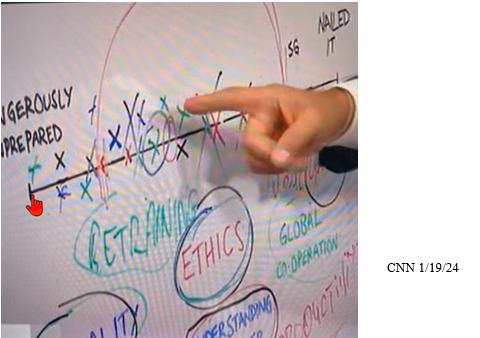
As the 2024 Davos meeting in Switzerland closed, CNN did an in-person, on-air straw poll with a couple dozen global executives and other important people on the question of world society being prepared for AI issues.
CNN Straw Poll Results:
- World society is dangerously ill-prepared for AI issues and events.
- The vast majority were very optimistic about the potential for AI.
- Crucial issues and questions were cited.
Clearly, AI will remain a big-time issue throughout the year and undoubtedly occupy a prominent position in the Davos discussions of 2025. The Public Relations Society of America’s (PRSA) newest publication, “The Ethical Use of AI for Public Relations Practitioners” could play an important role in helping world leaders sort out just how this technology is going to be utilized, managed, and in some cases survived. Ethical Use of AI Document
Many of the AI issues mentioned at Davos are reflected in PRSA’s Ethical Use document.
Some very specific concerns voiced by those attending Davos:
Retraining employees to accommodate AI, equality, ethics, the public good, possible global cooperation, security, the power of the technology itself. AI effect on productivity, polarization, and others.
These topics remain on the world’s AI discussion table.
PRSA’S Crucial Contribution
“The Ethical Use of AI for Public Relations Practitioners” breaks down three of the most crucial areas of ethical response options.
- Adverse endpoints that arise from operational outcomes.
- Examples of improper use of AI.
- Guidance from an ethical perspective on proper AI use.
What’s Needed Between Now and Davos 2025
In my judgment, based on what I’ve heard and seen and now with the published results of Davos, it’s quite clear that industry leaders remain confused though enthusiastic, anxious, yet committed to maximizing what AI has to offer. They are however missing one critical component which needs developing: Fact-based recommendations and an operational and reputational risk assessment related to AI issues.
Proposed
Fact Based Recommendations
Based On
Operational, Reputational, Risk-Assessment, and Recovery Readiness
Draft
Table Of Contents for
Proposed Fact-Based Recommendations
- The specific and attributed warnings, from the tech companies, in bold letters.
- The dozen or so most disastrous, costly, and worst-case guesses all gathered together in a single exhibit to focus attention and fear as well as encourage risk recognition. (We do the Reputational Risk part.)
- Warning signs, danger signals, and potential risks. How we might begin to recognize prevent, detect, deter, maybe deflect a disaster before it occurs
- Data-based Recommendations for doable operational and reputational preventive readiness and post-adverse event response readiness.
- Operational response readiness by scenario
- Reputational response readiness by scenario
- Organizational readiness structured around essential operational concerns. Help the bosses get ready to prepare their employees with response saavy.
My two cents: PRSA has earned a seat in the Davos AI discussion 2025


